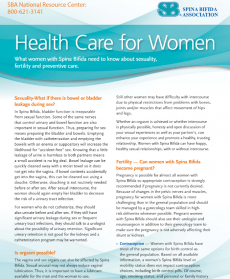Read about fertility, sexuality, preventative care.
How to prevent bladder and bowel leakage during sex
In Spina Bifida, bladder function is inseparable from sexual function. Some of the same nerves that control urinary and bowel function are also important in sexual function. Thus, preparing for sex means preparing the bladder and bowels. Emptying the bladder with catheterization and emptying the bowels with an enema or suppository will increase the likelihood for “accident-free” sex. Knowing that a little leakage of urine is harmless to both partners means a small accident is no big deal.
Bowel leakage can be quickly cleaned away with a moist towel, so it does not get into the vagina. If bowel contents accidentally get into the vagina, this can be cleaned out using a douche. Otherwise, douching is not routinely needed before or after sex.
After sexual intercourse, the woman should again empty her bladder to decrease the risk of a urinary tract infection. For women who do not catheterize, they should also urinate before and after sex. If they still have significant urinary leakage during sex or frequent urinary tract infections, they should talk to a urologist about the possibility of urinary retention. Significant urinary retention is not good for the kidneys, and a catheterization program may be warranted.
In Spina Bifida, bladder function is inseparable from sexual function. Some of the same nerves that control urinary and bowel function are also important in sexual function. Thus, preparing for sex means preparing the bladder and bowels. Emptying the bladder with catheterization and emptying the bowels with an enema or suppository will increase the likelihood for “accident-free” sex. Knowing that a little leakage of urine is harmless to both partners means a small accident is no big deal.
Bowel leakage can be quickly cleaned away with a moist towel so it does not get into the vagina. If bowel contents accidentally get into the vagina, this can be cleaned out using a douche. Otherwise, douching is not routinely needed before or after sex.
After sexual intercourse, the woman should again empty her bladder to decrease the risk of a urinary tract infection. For women who do not catheterize, they should also urinate before and after sex. If they still have significant urinary leakage during sex or frequent urinary tract infections, they should talk to a urologist about the possibility of urinary retention. Significant urinary retention is not good for the kidneys, and a catheterization program may be warranted.
Is orgasm possible?
The vagina and sex organs can also be affected by Spina Bifida. Sexual arousal may not always induce vaginal lubrication. Thus, it is important to have a lubricant available for the man and the woman to use. Still, other women may have difficulty with intercourse due to physical restrictions from problems with bones, joints and/or muscles that affect the movement of the hips and legs.
Whether an orgasm is achieved or whether intercourse is physically possible, honesty and open discussion of your sexual experiences as well as your partner’s, can enhance your experience and promote a healthy, trusting relationship. Women with Spina Bifida can have happy, healthy sexual relationships, with or without intercourse.
Fertility — Can women with Spina Bifida become pregnant?
Pregnancy is possible for almost all women with Spina Bifida so appropriate contraception is strongly recommended if pregnancy is not currently desired. Because of changes in the pelvic nerves and muscles, pregnancy for women with Spina Bifida is more challenging than in the general population and should be managed by a gynecology team skilled in high-risk deliveries whenever possible. Pregnant women with Spina Bifida should also see their urologist and neurosurgeon in addition to their gynecology team to make sure the pregnancy is not adversely affecting their shunt or kidneys.
Contraception
Women with Spina Bifida have most of the same options for birth control as the general population. Based on all available information, a woman’s Spina Bifida level or mobility status does not impact contraception choices, including birth control pills. Of course, age, smoking status, and personal or family history of blood clots does impact the risk of some birth control choices and should be discussed with your health care provider.
Condoms
One medical concern is latex condoms. Women with Spina Bifida have the potential for latex allergy, so non-latex condoms should be used unless they have tested negative for latex allergy.
Folic acid supplementation
Women with Spina Bifida are at a low increased risk of having children with Spina Bida. Taking folic acid can decrease this risk by up to 70%. Because half of all pregnancies are unplanned, any woman with Spina Bida who is having sex should take 4 milligrams of folic acid supplementation every day before becoming pregnant, and throughout the rest trimester of pregnancy. This is 10 times the recommended dose for women who don’t have Spina Bifida, and should be obtained through a prescription from your doctor. You should not take extra prenatal vitamins to get the higher folic acid dose as this would provide too much of the other vitamins.
Preventive Care — What medical screening is necessary?
Women with Spina Bifida should follow screening guidelines for breast cancer (mammography, MRI and/or ultrasound), annual gynecologist appointments that include a PAP smear and should receive the Human Papilloma Virus (HPV) vaccine.
This information does not constitute medical advice for any individual. As special cases may vary from the general information presented here, SBA advises readers to consult a qualified medical or other professional on an individual basis.
Tags



